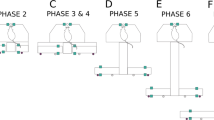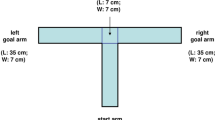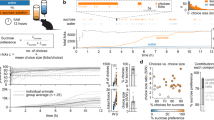Abstract
This protocol details a method to perform appetitively motivated tasks in rodents to test cognitive ability. When testing cognition in animals, the simplest paradigms can potentially yield quick results with minimal investment from the experimenter. Although appetitively motivated tasks are generally learnt more slowly than aversively motivated ones, they may be essential for distinguishing the effects of a treatment on learning from its effects on aversive motivation per se. For example, if a treatment improves learning in both types of paradigm, this is better evidence that it affects cognition rather than sensorimotor processes. Rats and mice easily learn position discriminations in a T-maze, especially if multiple cues, such as different objects and floor textures in the goal arms, are provided. To start, the rodent is placed in the maze and it chooses an arm. This Trial 1, however, is the only one on which this arm will be rewarded. From now on, it must always choose the other arm. The rule is simple: for example, always turn left into the arm with diagonal black stripes on the walls and gravel glued to the floor. High levels of correct responding can be achieved within 20–40 trials. The test may therefore be particularly useful with animals of low cognitive ability, such as transgenic mice derived from some 129 or SJL strains. Once the animals are habituated, each trial should take approximately 1 min. Thus, to test ten animals for 40 trials would take around 7 h.
This is a preview of subscription content, access via your institution
Access options
Subscribe to this journal
Receive 12 print issues and online access
$259.00 per year
only $21.58 per issue
Buy this article
- Purchase on Springer Link
- Instant access to full article PDF
Prices may be subject to local taxes which are calculated during checkout
Similar content being viewed by others
References
Duff, K. & Suleman, F. Transgenic mouse models of Alzheimer's disease: how useful have they been for therapeutic development? Brief Funct. Genomic Proteomic 3, 47–59 (2004).
Gerlai, R. Gene-targeting studies of mammalian behavior: is it the mutation or the background genotype? Trends Neurosci. 19, 177–181 (1996).
Contet, C., Rawlins, J.N.P. & Deacon, R.M.J. A comparison of 129S2/SvHsd and C57BL/6JOlaHsd mice on a test battery assessing sensorimotor, affective and cognitive behaviours: implications for the study of genetically modified mice. Behav. Brain Res. 124, 33–46 (2001).
Heikkinen, T., Puoliva, J., Liu, L., Rissanen, A. & Tanila, H. Effects of ovariectomy and estrogen treatment on learning and hippocampal neurotransmitters in mice. Horm. Behav. 41, 22–32 (2002).
Deacon, R.M.J. & Rawlins, J.N.P. T-maze alternation in the rodent. Nat. Protocols 1, 7–12 (2006).
Acknowledgements
This work was supported by Boehringer Ingelheim Pharma GmbH & Co. KG and grant GR065438MA from the Wellcome Trust to the Oxford OXION group.
Author information
Authors and Affiliations
Corresponding author
Ethics declarations
Competing interests
The author declares no competing financial interests.
Rights and permissions
About this article
Cite this article
Deacon, R. Appetitive position discrimination in the T-maze. Nat Protoc 1, 13–15 (2006). https://doi.org/10.1038/nprot.2006.3
Published:
Issue Date:
DOI: https://doi.org/10.1038/nprot.2006.3
This article is cited by
-
Scalp recorded theta activity is modulated by reward, direction, and speed during virtual navigation in freely moving humans
Scientific Reports (2022)
-
Inter-individual differences in laboratory rats as revealed by three behavioural tasks
Scientific Reports (2022)
-
The lateralization of left hippocampal CA3 during the retrieval of spatial working memory
Nature Communications (2020)
-
Elucidation of Acute and Neurobehavioral Toxicity of E-Waste Extracts with Special Reference to Cognitive Impairment, Anxiety and Stress Response Using Zebrafish
Toxicology and Environmental Health Sciences (2019)
-
Regulation of striatal cells and goal-directed behavior by cerebellar outputs
Nature Communications (2018)
Comments
By submitting a comment you agree to abide by our Terms and Community Guidelines. If you find something abusive or that does not comply with our terms or guidelines please flag it as inappropriate.



